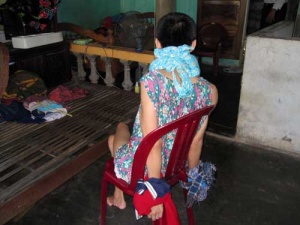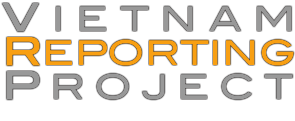By Henry Liem

Nguyen Tri Lam, 20, is seated with his hands bound to prevent him from hurting himself. Photo credit by Henry Liem
My friend Tran Viet Tram, who was stationed with me in Can Tho in the Mekong Delta during our time in the South Vietnamese Army, greeted me at his home in a village near Cam Lo, Dong Ha.
He ordered his wife and children to cat co, cut the neck, of their only rooster crowing in the backyard, and serve me a Huda beer. His wife cried, but acquiesed. I, too, loved the rooster – a proud, loud and beautiful male figure in his realm. But being of a higher kingdom, we had to eat him – but not without a transmutation prayer.
I had just returned from visiting Khe Sanh, where 42 years ago, the Dien Bien Phu-like battle was fought. Oh, all those American names for this region: Carroll Fire Base, the Rockpile… There is, in me, a familiar sense of belonging to this land and its names. I don’t know why. Maybe the names stayed with me from those propaganda songs I listened to in my distant past. They are all coming back to me, hauntingly tragic and funny at the same time.
We sat on the floor for lunch. After a few bottles of Huda with ice, I began my usual questioning, as old friend returning home.
“Hey Tram, do you know anyone suffering from Agent Orange health problems in this village?”
“Oh yes! My younger brother has two children with Agent Orange diseases. His name has the same as you, Liem.” I asked him to invite his brother over.
Mr. Liem joined us half an hour later. He looked peasantly innocent and simple. During lunch, he kept looking at me and smiling as if he were the happiest man on earth. But no, his older boy passed a way two years ago due to, in his words, “Agent Orange diseases.” His 23-year-old daughter, who is mentally handicapped, just stays home, completely disfunctional.
“Do you blame the Americans for this?” I asked, almost putting words into this innocent peasant’s mouth. But he was stronger than I thought. “Oh no! It’s our karma. We have bad karma. That’s why!”
“Bad karma! That’s so generous of you,” I said in a lawyerly tone, as if cross-examining of a hostile witness. “If someone came to your house and attacked your family for no reason and inflicted great suffering on you, do you think this is due to bad karma? Would you not attribute any responsibility to the attacker?”
“Yes, that’s right! Our bad karma! The Buddha says so!” He held his ground.
“So, what do you think of the Americans who sprayed Agent Orange on your land and caused all this suffering?” I could sense that my leading questions were going nowhere. He answered me in a rather sad, quiet tone, “Brother Liem. They just did their job. I have no anger, no ill will toward anyone. Buddha bless them and us all.”
I thought to myself, “I have no further questions for this witness, your honor!”
Two hours later – half toned up on Huda beer and rooster meat – while visiting a family of two victims, I was not sure that the Buddha’s teaching on karma and forgiveness was really that powerful.
Nguyen Tri Lan is 20, and his younger sister, Nguyen Thi Hang, 18, had their arms and feet bound by strips of cloth. They were positioned on chairs like handcuffed prisoners. Their mother, Nguyễn Thị Phận, (“Nguyen the Fate”- fatefully named!) told me that it was necessary to prevent them from scratching and biting themselves. They yell and scream every night. When the nights are too hot, they howl “like wild dog,” said Phận.
Phận said that initially she was afraid that the neighbors would be bothered by the noise from her children. But now, they all understand their problem. Yes, she does care for her neighbors.
When I asked Phận how she felt about this tragedy, she gently told me that its is “all due to her name.” What?
“Yes, my name, ‘Nguyen the Fate,’ is the real cause,” she said. “You see, brother, maybe you don’t know this, but your name is your life. There are no other causes. I guess my dad just happen to give me a bad name. But I don’t think that he was aware of this either. No father would want to give his daughter a fate like mine.”
When it was time to say goodbye to Phận, she took hold my hand softly and smiled peacefully. I thought I had met Quan Yin (Quan The Am) Buddha. Blessed are the innocent for the gates of heaven are open and waiting for them.






